#Dianic Wicca
Text
I think that radical feminists have issue seeing the worth of witchcraft, dianic witchcraft and female-centred witchcraft because they do not know much about it. The reason it drew me in was because of rituals and symbols. There are a few radfems I have seen who understand that the lack of positive symbols in religion have a negative effect of women everywhere. Men have the cross, women have the apple. That sort of thing. However female-centred witchcraft seeks to change that and instead have positive symbols and rituals that explore aspects of things unique in women! Such as our life experiences and our bodies.
These are some extracts of Ruth Barrett’s Women’s Rites, Women’s Mysteries, which is a book on Dianic Witchcraft. Now before I share I want to preface that spirituality simply isn’t for everyone. I’m not advocating to convert you. I am merely sharing in the hopes you will see WHY some radfems choose to explore the Dianic spirituality, or even just female centred witchcraft that tends to follow a variation of the same thought process.

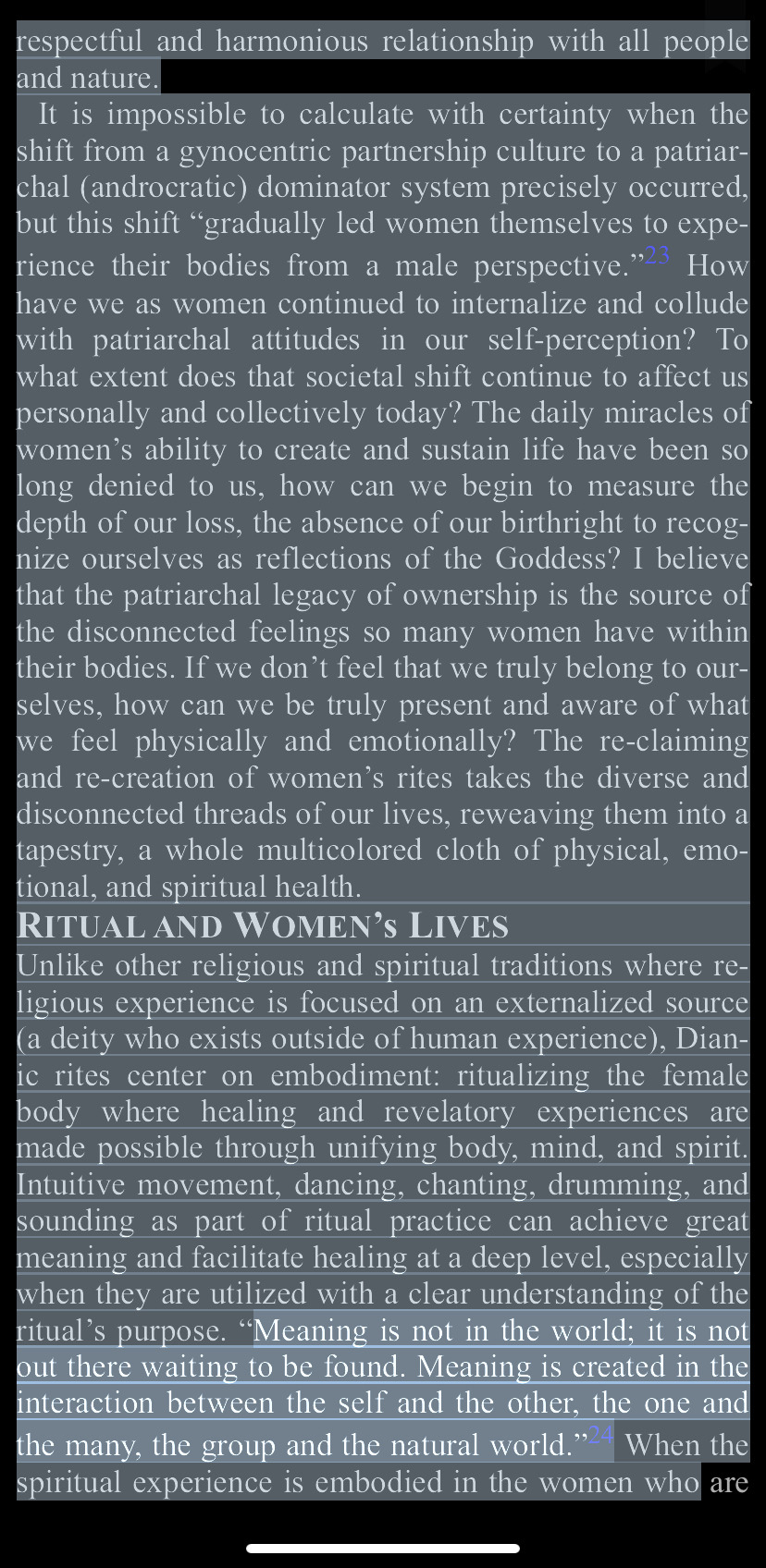
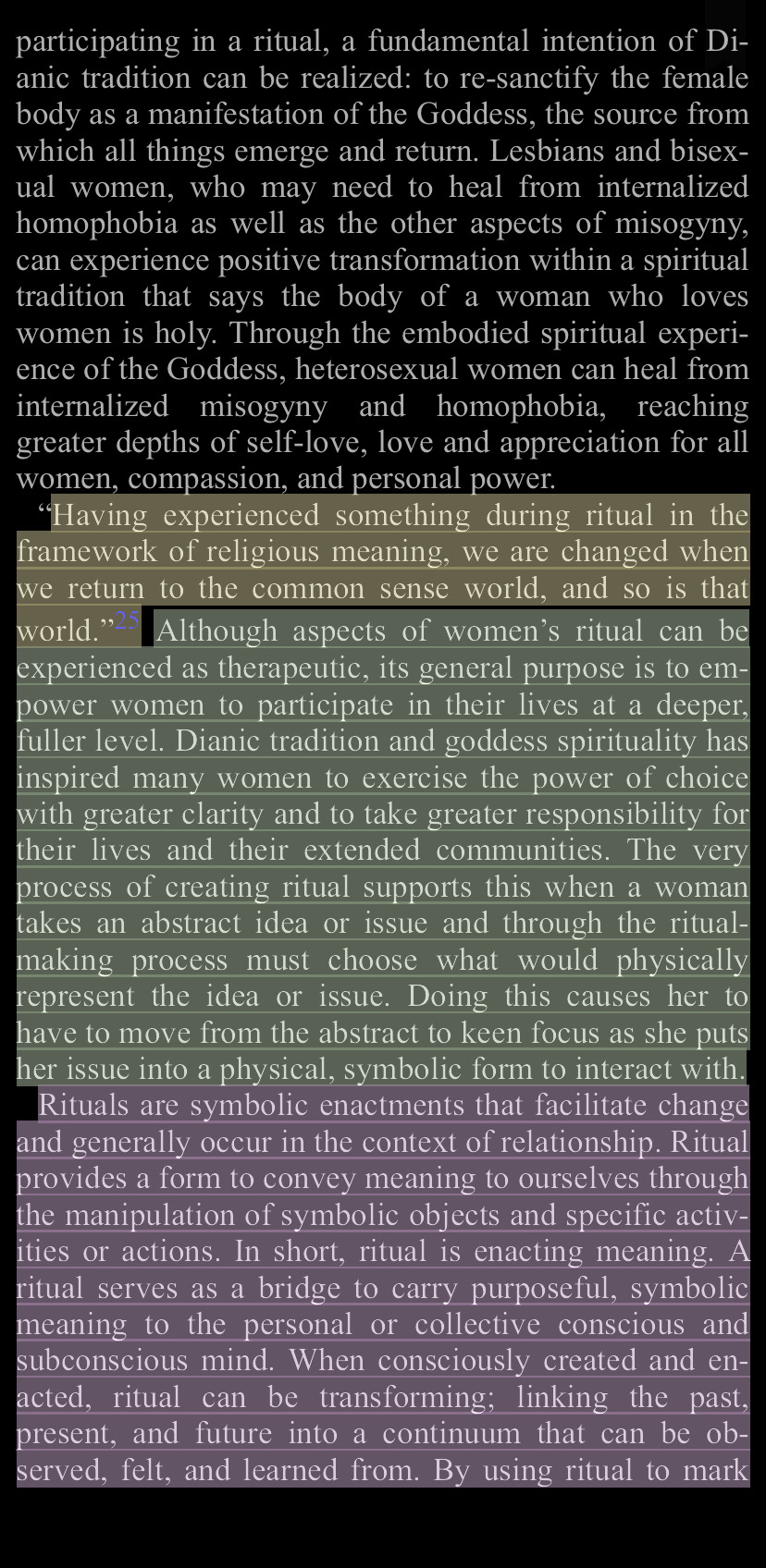
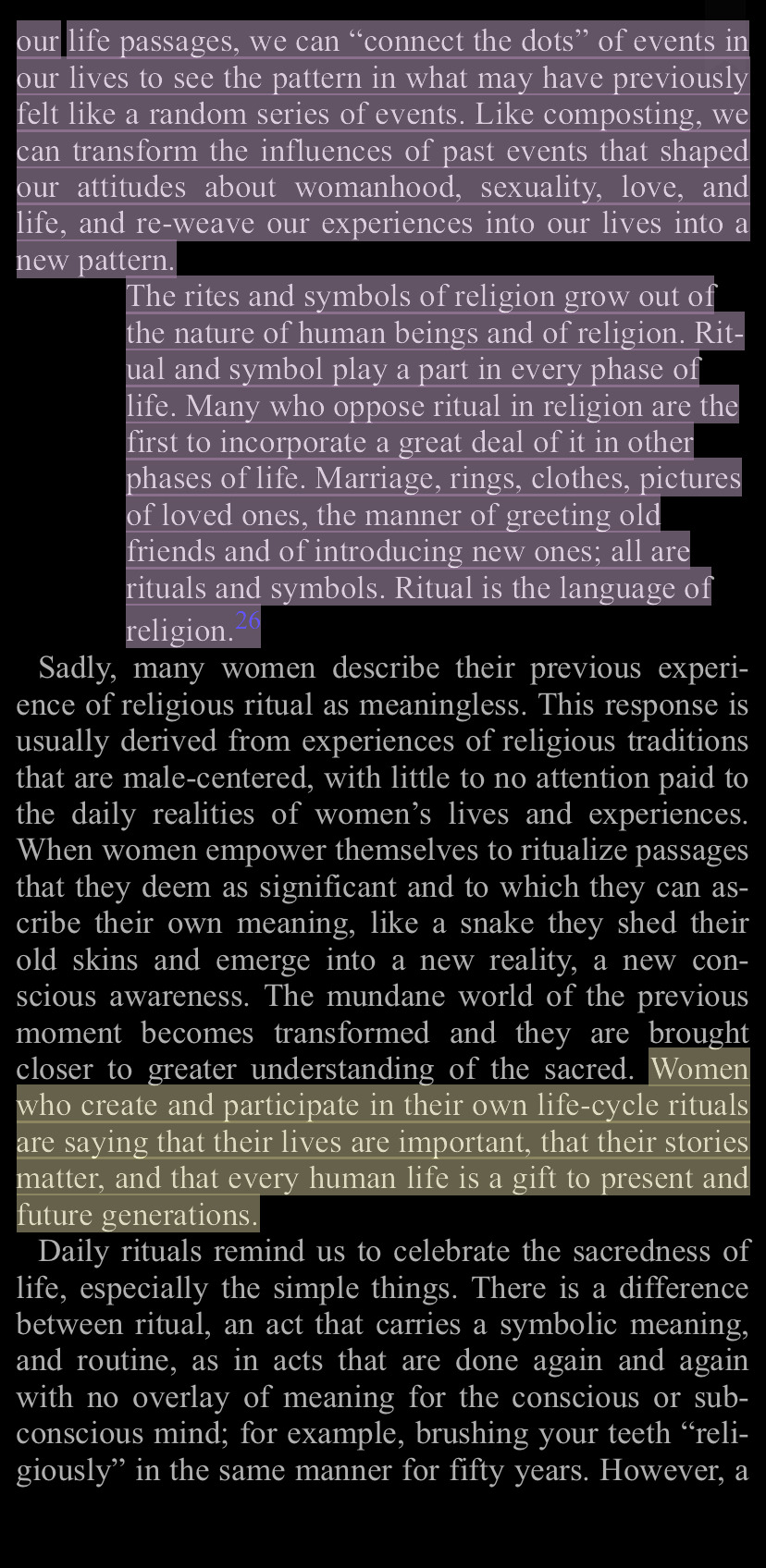


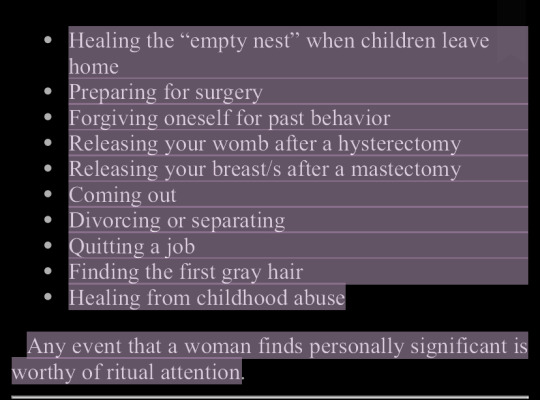
I think upon reading these, it is difficult to not see the worth of witchcraft that some of us see.
#radical feminism#radblr#radical feminist safe#radical feminist community#radical feminists do touch#radical feminists do interact#radical feminist#dianic witchcraft#dianic wicca
412 notes
·
View notes
Text
If you are a "Dianic Wiccan" or call yourself a "Dianic witch", I'm just going to assume you're a TERF and block you. Sorry not sorry.
#witches of color#dianic wicca#dianic wiccans dni#witchblr#witch community#witchcraft has no place for bigotry
286 notes
·
View notes
Text
My Dianic/Female Centered witch reading list (will update as I get more)!
The Holy Book of Women’s Mysteries by Z. Budapest (because obviously)
The Chalice and the Blade by Riane Eisler
Who Cooked the Last Supper? by Rosalind Miles
The Skeptical Feminist by Barbara G. Walker
The Spiral Dance by Starhawk
Women’s Rites, Women’s Mysteries by Ruth Barrett
The Pagan Book of Living and Dying by Starhawk
Moon Time by Lucy H. Pearce
Witches, Midwives, and Nurses by Barbara Ehrenreich and Deirdre English
Women Who Run With The Wolves by Clarissa Pinkola Estes
WomanRunes by Starhawk and Molly Remer
Whole and Holy: A Goddess Devotional by Molly Remer
You are the Placebo by Joe Dispenza
The Power of Ritual by Casper Ter Kuile
Feel free to leave some recommendations! I really like hearing especially about non-pagan books that influenced your practice (like the last two listed here were for me)!
Blessed be! 🌙💫✨
361 notes
·
View notes
Text
“For many, the very thought of creating meaningful ritual is too intimidating. Out of societal conditioning, women often wait for others to take the lead or simply suppress their own needs, desires, and dreams to varying degrees. Consequently, we lead lives that too often are physically, emotionally, and spiritually unfulfilled. Because daily life has become so increasingly trivialized and superficial, it is all the more critical that women challenge themselves to make meaning in their own lives and in the lives of others. We are the women we’ve been waiting for.”
— Ruth Barrett, Women's Rites, Women's Mysteries: Intuitive Ritual Creation
44 notes
·
View notes
Text

I’m drawn to this portion from the last chapter of The Holy Book of Women’s Mysteries (Z, Budapest) and with a quick google I can’t find much on a sun goddess named Lucina. Does anyone have any information to confirm her existance or not?
#I’m taking this book with a grain of salt#dianic wicca#dianic witchcraft#the holy book of womens mysteries#excerpts#goddess worship#witchcraft#witchblr#witch#witches#baby witch
79 notes
·
View notes
Text
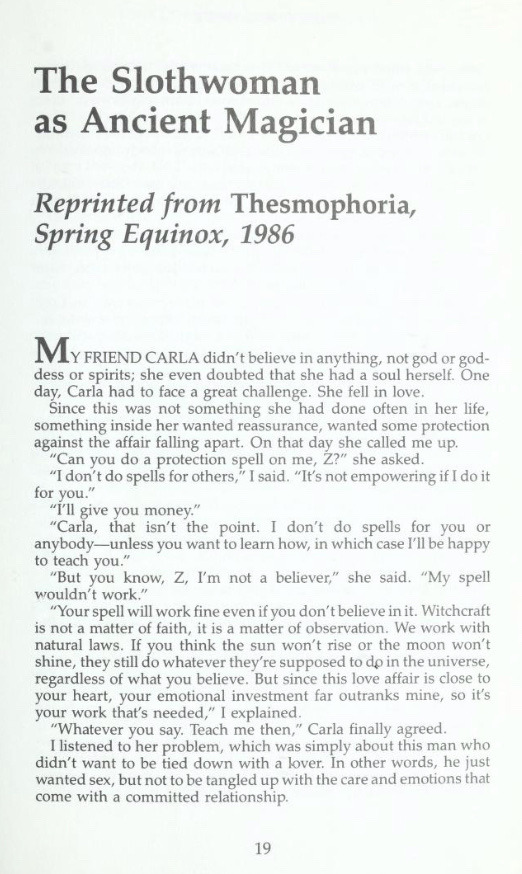
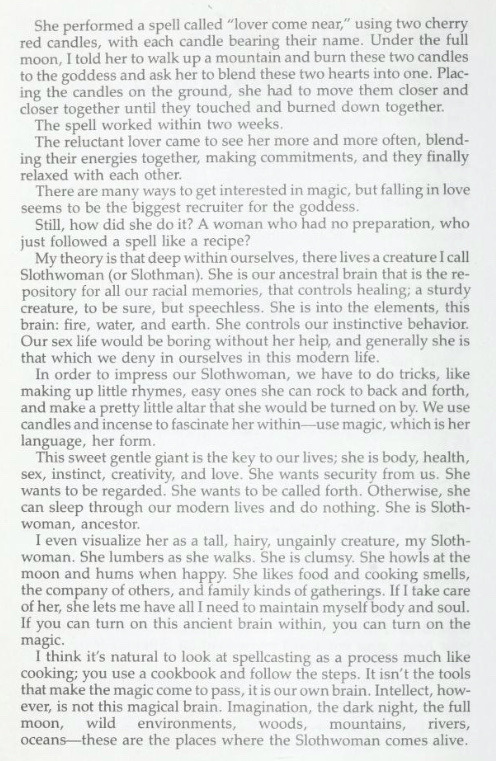
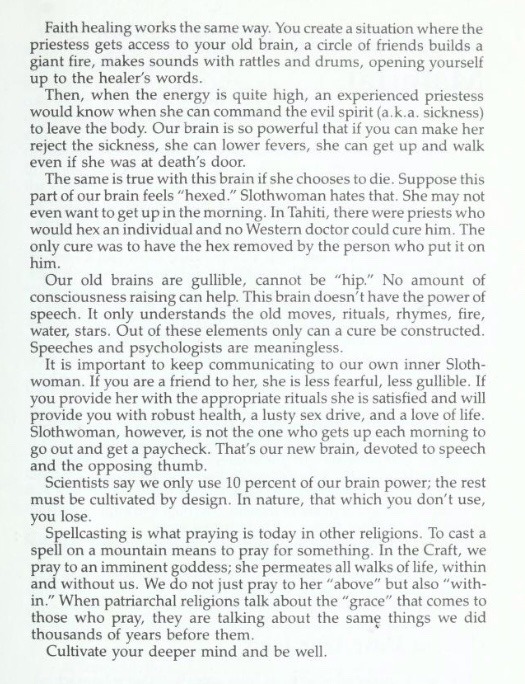
The Holy Book of Womyn’s Mysteries - Zsuzsanna Budapest
#yiv#dianic wicca#bearwoman#womens spirituality#goddess spirituality#goddess worship#deanism#filianism
123 notes
·
View notes
Text
Dianic/ Feminist/Goddess reads I've completed and recommend:
Ruth Barret's Women's rites, Women's mysteries. Generally teaches you how to approach priestess work and I will get it when embarking in my priestess journey in a physical copy. Moved me to tears at some points and it may trigger some who have mother issues.
Rebirth of the Goddess, Carol Christ. Actually moved me to tears in many parts and generally talks about the birth of the Goddess movement
The Living Goddess, Marija Gimbutas. Has inspired many sketches due to the lovely collection of Goddess work it has and has deeply soothed me
Keeping her Keys, Cyndi Brannen, first introduction to Hekate and her movement.
Hekate, Her sacred fires, Sorita D'Este. The introduction is a splendid recap of The Goddess's history and a rough timeline of all of her recorded existence
The Witch's path by Thorn Mooney winch i made a more in depth review here: (( As a side note it's gender friendly but none the less a useful manual))
Goddess in Everywoman by Jean Shinoda Bolen: An introduction of how Goddesses may appear on a woman's life as Archetypes. Leans on Jungian Analysis. Is an interesting way of looking at your own personal development. I've read this in a rather long time ago and debated since then including or not but it is female centered and uses the Goddess and her imagery, thus I'll allow it
Dance of The Dissident daughter By Sue Monk. Like Lisa Lister's The Witch it's the memoir of a woman coming into the Goddess. Generally Powerful read if a woman needs to unravel growing up in the bowels of patriarchal thought. Does lean on annoying female-male duality that I dislike but doesn't take away from how resonant it is none the less.
A Deusa do Jardim das Hesperides By Luiza Frazão, a goddess oriented book in Portuguese focusing on the Goddess in this specific part of the world! A wonderful book detailing the tradition that The Authoress created from the celtic inspired tradition of Avalon.
Witch: Unleashed, Untamed, Unapologetic by Lisa Lister. Part Time Memoir, Part Time actual spell book, Lisa Lister's Witch is a treat to go through. It's rather casual in its tone but all the same relies a lot of feminine wisdom with an unabashed love for the female body and exclusion of men and Trans Id men from the discussion as it should. Slight male fangirling and "Patriarchy hurts man too you guyz", so be forewarned. Still an enjoyable book to pick up!
I am in the process of reading more and definetly have more on my pile to read but this one's I have completed with most certainty and can recommend to people interested in Goddess specific things. Many of this can be found in Pdfs on Z-library if accessed through a tor browser or the brand new Anna's Archive. If curious about any books I can attempt to provide a pdf.
Coming soon: A deeper look into female spirituality @spiraldancer
~Selenita Signs out.
#witchcraft#witchblr#beginner witch#witch#pagan#paganblr#dianic witchcraft#dianic wicca#witch is a woman#feminist witch#baby witch
197 notes
·
View notes
Text
TRAs swarm every topic related to women like locusts, no matter how niche. I wanted to listen to some youtube video about Dianic Witchcraft while doing chores today and haven't found a single video that wasn't about trans people. I don't even know, maybe some women-made videos were arguing against male inclusion, I don't care because this isn't what I wanted to learn today. Same goes for so many other topics. It is infuriating and lowkey pathetic how male-obsessed everyone is.
173 notes
·
View notes
Text
whether you're religious or tolerate religions or not, dianic traditions are culturally significant to feminism and will remain so as the movement progresses into whatever stage is next in the west. specifically because it's so female-centric and nature-loving which is very threatening to the judeo-christian conscious of the imperial west
13 notes
·
View notes
Text
“Fraternize means to behave like a brother. Luke told me that. He said there was no corresponding word that means to behave like a sister. Sororize, it would have to be, he said. From the Latin.”
- Margaret Atwood, The Handmaid’s Tale
When re-reading this book, this quote particularly stuck out to me. The way that women do not have a verb form of sisterhood. It’s something I knew, intrinsically, but never thought about.
It motivated me to put it into a spread in my Sacred Book. One page, this quote, the next page an oath of sisterhood:
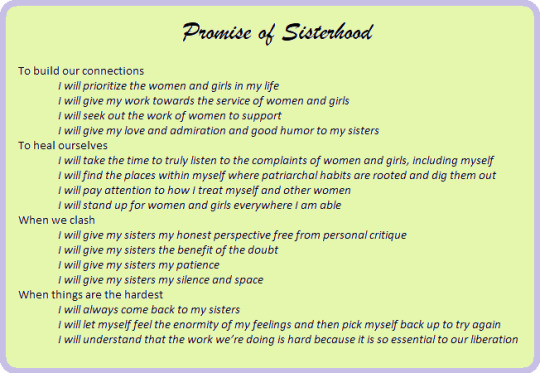
Let’s commit ourselves to “sororize”, not just in our vocabulary, but in our actions!
159 notes
·
View notes
Text
btw terfs need to leave dianic Wicca alone. Like Wicca (at least in my tradition) is literally based on the idea that one infinite genderless being is split into male and female avatars. Even if you’re just in it for the Goddess, her origins are deeply connected to transfems based on how we perceive them both.
also the burning times didn’t exist and you need to stop harping on that.
signed, an nb witch
#the one is the non-binary religious rep that I want#wicca#paganism#wiccan#anti gender critical#transgender#dianic wicca#a.t. shrieking
10 notes
·
View notes
Text
I am amazed at the christian god's 'thinking' into existance vs the dianic goddess' 'birthing' into existance. The christian god is the god of man and men can only think, not birth, life into existance.
36 notes
·
View notes
Text
Reading Lisa Lister's The Witch ( and actually planning on finishing it) and I feel it's just what I needed after feeling really down on myself lately
14 notes
·
View notes
Text
Radical Feminine Power of Rebirth
For some Women, descending to the underworld, dying at the hands of our own dark feminine, and being reborn in the womb of Goddess, is the easy part.
For some Sisters, the true difficulty comes through rising back up out of the cocoon of the depths, and negotiating our new selves with the hostile outer world.
For some of us, the greatest challenge comes from resisting the pressures and toxicity of a sick society.
While there is a profoundly sacred process that unfolds as we unravel down into the void of the no-thing and allow ourselves to dissolve all falsity so that we can be reborn in the womb of Source, ...we are not meant to stay there forever.
Women are designed, like nature, to reformulate, to reconstitute, to become material all over again.
But we are not who we were before.
And we will never be that one again.
Women are made from the ashes of all that has been annihilated by the mercy of rebirth, but we have also been purified, alchemized, and transformed into something new.
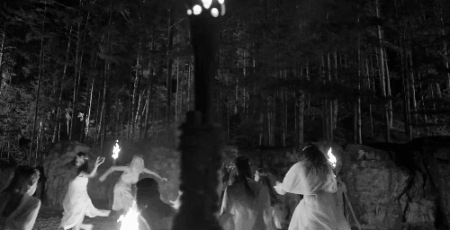
Even if we know that the former self will not serve the next chapter of our evolution, the grieving process operates within her own emotional timing. The heart can ache for what was sacrificed in order to open a greater vastness of our own depths.
We may even vow to not engage with the world.
To not claim our crown in the Great Above.
To not face our relationships, our work, our toxic culture.
To not live again in the light.
Nonetheless, the sacred intelligent impulse of life will eventually call us back up into the light whether we wish for it, believe we are ready for it, or not.
A woman's descent to the underworld is not just a journey to the source of truth of your own being and of your own creation.
It is an essential part of the path of reunification, of accessing a fuller range and a fuller spectrum of the totality that you are.
It is a journey of becoming more and more whole.
Whether we realize it or not, we are already in the midst of this process by product of existing within a cyclical feminine Earth and residing within a cyclical female body. We are governed by the seasons of inner and outer nature.
When we bring consciousness to this process we allow ourselves to not only more naturally move through the rebirth process with a deeper sense of trust, we also get to receive more of the medicine that exists within every season and cycle of our nature.
In turn, we discover more of our exclusively feminine power.
Blessed be, Sisters.
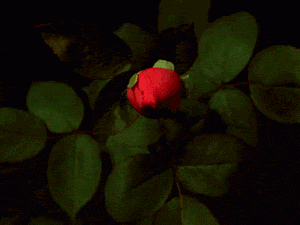
#radfem#divine feminine#feminine#feminism#witchcraft#dianic wicca#period#rebirth#healing#women's health
7 notes
·
View notes
Text
Dianic Wicca: A Brief Description and History
Also known as Dianic Witchcraft, this is a modern pagan goddess tradition that focuses itself on the female experience and empowerment.
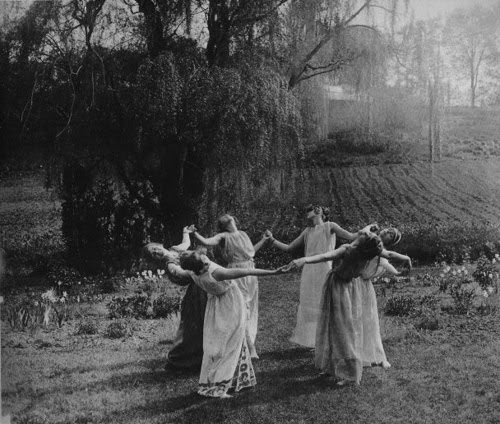
Beliefs
Dianic Wiccan ritual and belief structures are a combination of different elements from British Traditional Wicca, Italian folk-magic, New Age beliefs, and many Celtic influences. While some adherents identify as Wiccan, Dianic Wicca differs from most traditions of Wicca in that only goddesses are honored (whereas most Wiccan traditions honor both female and male deities).
While Diana does have a triple aspect, it is in Her aspect as Virgin Huntress that She guides Her daughters to wholeness. She is “virgin” in the ancient sense of “She Who Is Whole Unto Herself.” The ancient meaning of “virgin” described a woman who was unmarried, autonomous, belonging solely to herself. The original meaning of this word was not attached to a sexual act with a man. Diana/Artemis did not associate herself or consort with men, which is why these Goddesses are often understood to be lesbian.
Barrett, Ruth Rhiannon (2008). "Lesbian Rituals and Dianic Tradition". Journal of Lesbian Studies.
Practices
Covens typically practice meditation and visualization in addition to different forms of spell work. Practitioners focus on healing themselves from wounds given by individual men or that of the patriarchy, while also affirming the state and value of their womanhood.
Rituals may include reenacting spiritual/religious lore from a female-centered standpoint, with the theme of celebrating the female body and grieving the consistent societal abuses of women.
Some Dianic Wiccans eschew manipulative spellwork and hexing because it goes against many interpretations of the Wiccan Rede. However, many other Dianic witches (notably Budapest) do not consider hexing or binding of those who attack women to be wrong, and actively encourage the binding of rapists.
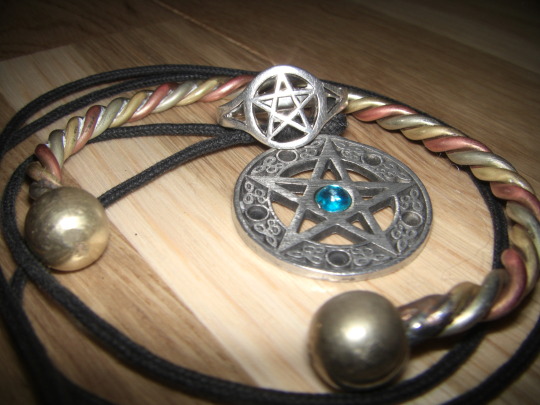
Zsuzsanna Budapest
Budapest's branch of Dianic Wicca began on the Winter Solstice of 1971, when Budapest led a ceremony in Hollywood, California. She is considered to be the “mother of modern Dianic Wicccan tradition”.
She claims her mother was a witch and a medium; therefore, Z herself is a hereditary witch (meaning a witch by birthright). She was on the staff of the first Women's Center in the U.S. there for many years, and became the Founder and High Priestess of Susan B. Anthony Coven #1 (the first women-only witches' coven). She was responsible for the creation of an Anti-Rape Squad and the Take Back the Night Movement in Southern California, facilitating a great many of their street marches.
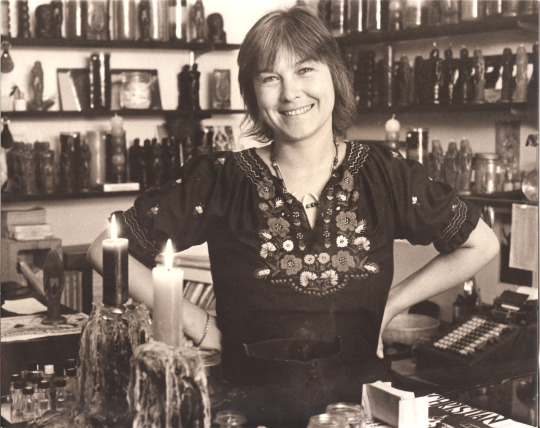
Criticism for Transphobia
It is important to note that while Dianic Wicca has proven to be a safe space for many cisgender women, it has not been incredibly open towards transgender sisters. In February 2011, Zsuzsanna Budapest conducted a ritual with the Circle of Cerridwen at PantheaCon for "genetic women only" from which she barred trans women as well men. This has created a backlash against Budapest, claiming that she is a transphobic lesbian-separatist leading an exclusionary movement.
24 notes
·
View notes
Text
If you feel comfortable putting the specific city/state, feel free to do so in the tags!
I’d love to start connecting together because this path can be a very lonely one if the only community is online!
💫✨🌙
#dianic witchcraft#dianic wicca#feminist spirituality#female-centered spirituality#goddess spirituality
28 notes
·
View notes